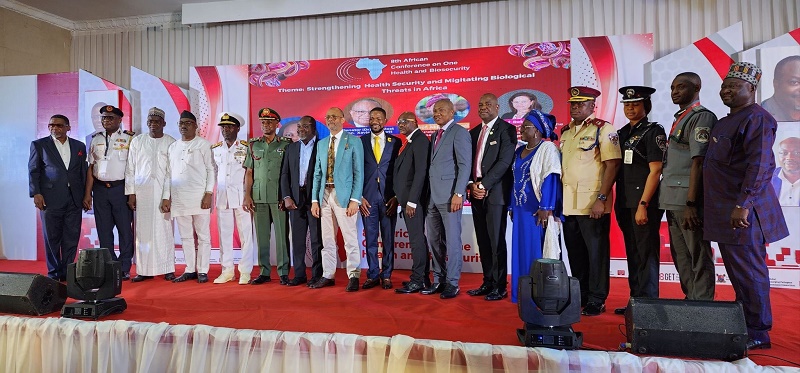Experts say the outbreak of COVID-19 nearly three years ago has triggered a greater appreciation of the importance of health security and intelligence capabilities.

The pandemic highlighted how devastating an infectious disease can be within a short period of time and its potential impact on the global economy.
It also showed how it can dramatically change our daily lives and social interaction.
To forestall an impact of a similar magnitude, experts say it is important that developing countries upgrade their health personnel, infrastructure, and institutions.
Due to their weak health infrastructure, developing countries such as Nigeria are vulnerable to biological threats, says Prof. Akin Abayomi, Lagos State Commissioner for Health.
He said this in a statement to announce the 8th African Conference on One Health and Biosecurity.
Abayomi said that it was important for Nigeria to improve its preparedness against biological threats by building appropriate infrastructure and putting in place the right policies.
“We should realise the need for all states of the federation and the FCT to come together and prioritise efforts to prepare for, detect, and respond to pandemics and other health security threats,” he said.
Abayomi said that relevant sectors must share and integrate experiences from across the country to improve their capabilities and coordination across various sectors.
“We also need to take rapid, transparent and accountable actions and apply the critical lessons learned from the COVID-19 pandemic and other recent health emergencies.
“Now is the time to deliberately integrate these lessons into national efforts to improve capacities and strengthen the country’s health security architecture,” he said.
He said that there was a need to enhance biosurveillance, laboratory capacity, workforce development, and emergency response.
“It also includes mitigating the risks associated with biological facilities and professionals handling and storing infectious pathogens across the count,” he said.
Dr Akyala Ishaku, Senior Lecturer, Department of Microbiology, Nasarawa State University, Keffi, said the country needed to its improve coordination and health emergency response mechanisms.
“There is no doubt that the world will face more pandemics; and there is good reason to think that future generations will be facing even greater risks of engineered pathogens,” he said.
Ishaku said that investing in pandemic prevention was essential to defend against future outbreaks.
According to him, given the health and economic costs of COVID-19 and the expected impacts of future pandemics, there is the urgent need to scale up investment in the health sector.
“Investing in metagenomic sequencing disease surveillance currently involves looking for specific known pathogens.
“While this is good for monitoring the epidemiology of identified diseases, it leaves humans vulnerable to novel pathogens, which can spread quickly through the population with little to no immunity.
“The investment to prevent future pandemics has been minuscule. In purely economic terms COVID-19 cost the country N500 billion,” he said.
He said that the country needed funds to reduce pandemic risks, manufacture vaccines, carry out disease surveillance, among other interventions.
To successfully prepare for any health emergency such as disease outbreaks requires carrying stakeholders along, rather restricting it to health workers.
“In any large-scale biological incident, the medical community is often not the first to respond to an outbreak, it is normally the emergency responders including law enforcement,” according to Dr Aminu Magashi, Coordinator, Africa Health Budget Network (AHBN).
Magashi said for effective mitigation the country must ensure that a multi-sectoral training approach was adopted in the efforts to strengthen disease outbreak detection and response mechanisms.
He said the template, which he described as OneHealth approach, was a unifying approach to balance and optimise the health of Nigerians, animals and protect the environment.
He also said that by working together stakeholders and partners could collectively mitigate the spread of infectious pathogens.
“These efforts will not only contribute to the prevention of future epidemics and pandemics but help to build a more resilient and equitable environments, societies and economies,” he said.
He also advocated the establishment of biosafety (biobank) laboratories in the 36 states of the country and the FCT to mitigate future pandemics and charged state governments to have a budget line for health security strengthening in their budgets。
Meanwhile, Mr Micheal Ozemhoya, Country Representative, Innovative Biotech Limited, said that the COVID-19 pandemic had shown that multi-sectoral coordination between the public and private sectors could enable a faster response to disease outbreaks.
Ozemhoya said the country needed to guard against future biosafety challenges by manufacturing its vaccines, diagnostic tools, therapeutics, and home-grown medical countermeasure,.
“While the government is considering these steps, it should also create sustainable, adaptable, rapidly scalable, and geographically distributable capabilities to better address future threats in the country.
“Nigeria must invest more in critical capacities to prevent, detect, and respond to epidemic and pandemic threats.
“It should explore investments, partnerships, and models that can inform a strategy for fostering a sustainable national manufacturing industry and distribution networks across the 36 states of the Federation and the FCT,” he said.
By Racheal Abujah, News Agency of Nigeria (NAN)
